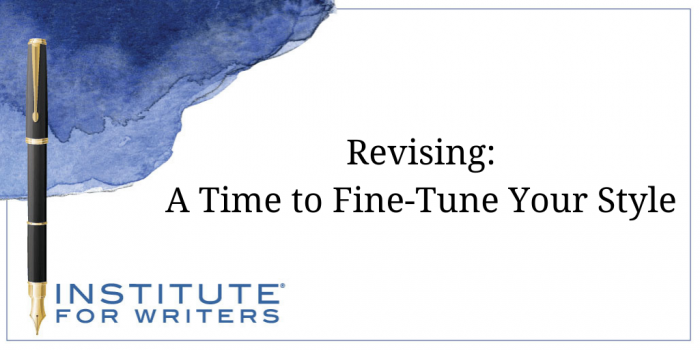1000 N. West Street #1200, Wilmington, DE 19801
© 2024 Direct Learning Systems, Inc. All rights reserved.

We teach our students how to write and get published!
View our Course Catalog >
As experienced writers know, revising involves more than changing word counts, fixing punctuation, or checking for accuracy. Revision is also the time —think “opportunity”—to make our writing more vibrant, meaningful, and distinctive. Fine-tuning the style can turn “okay writing” into writing that transports the reader to other worlds and inside the minds and hearts of our characters.
Revising for style may require multiple sessions, depending on the project and our working methods. Many writers read their manuscripts aloud at least once, especially to check pacing, flow, and rhythm. Years ago, a wise editor told me, “Our ears can spot things our eyes miss.”
Try these suggestions to fine-tune your style.
1. Ditch the clichés.
Do your characters have “teeth white as pearls?” Are they “dog-tired” or “fit to be tied”? Do the city lights “sparkle like diamonds”? Did people “weather the storm” while it “rained buckets”? Root out trite expressions unless they serve a purpose (e.g. a character uses clichés in speech). Find fresh, individualized ways to describe things for readers. For example, instead of “He was a sleeze,” C. Robert Cargill, author of Dreams and Shadows wrote: “Simon Sparks was an oozing slug of a man poured neatly into a three-piece suit.”
2. Check for sentence variety.
Do any passages sound choppy? Monotonous? You might need more sentence variety, in terms of construction and/or length. Look for places where several sentences begin with the same parts of speech (often a subject-verb combination) or even the same words (e.g. The, It, He, She, They, or a character’s name).
Add variety by starting with verbs, clauses, adverbs, or prepositional phrases. Of course, too much variety can distract the reader and sound contrived. (That can also occur when we use numerous different words for “said.”)
Aim for variety in sentence lengths, too. Compare these paragraphs:
Draft: Jacques Cousteau was determined to explore the ocean. Cousteau faced a number of obstacles, however. Deep-sea diving equipment was primitive. Divers wore bulky suits and heavy metal helmets.
Revised: Jacques Cousteau was determined to explore the ocean, but he faced big obstacles. For one thing, the equipment was primitive. Deep-sea divers wore bulky suits and heavy metal helmets.
A series of short fact sentences can sound choppy. Try combining ideas:
Choppy: Seals are mammals. They give birth to live young.
Better: Like other mammals, seals give birth to live young.
Note: Maintaining a certain length might suit the mood in a scene. For example, terse, short sentences (including fragments) can work in tense scenes. And when characters experience strong emotions, they rarely think in an organized, literary-sounding way.
Check paragraph lengths, too. A mix of short and long paragraphs can add eye appeal and keep readers alert.
3. Word Power
Revision is the time to trade bland, general language for specific words that convey our meaning with style. Is that shirt just “blue” or maybe ultramarine or the color of a blue jay or October sky?
Verbs are a good place to start. Choose verbs that help readers see, hear, smell, taste, and feel what you intend.
Examples:
Draft: “Look what you’ve done!” Dell said in a loud, angry voice.
Revised: “Look what you’ve done!” Dell thundered.
Draft: She entered the restaurant smugly, head high.
Revised: She strutted into the restaurant.
We can often replace forms of have, do, get, and to be with specific verbs that create livelier pictures.
Draft: They were in the small kitchen.
Revised: They clustered in the small kitchen.
Replace passive phrases with active verbs.
Draft: She got hit in the arm by a stray ball.
Revised: A stray ball smacked her arm.
4. Set the Mood
Use language that suits the mood of your scene or subject matter. Suppose your character is moving quickly. She might prance if she’s happy but scurry if she’s nervous or flee if she’s frightened. Is your scene suspenseful, romantic, hectic, eerie, placid? Choose words and craft sentences accordingly.
Word sounds can enhance the mood. If your scene occurs around water, choose words that sound … water-y. Some words sound like what they mean. Consider click, slither, shriek, clammy, crush, poke, anguish, grotesque, parched, swish, snap, wobbly, and prickle. What would you add to this list?
Word choices also contribute to pacing. While some words sound leisurely (stroll, meander, trickle), others quicken the pace (dart, zoom, gush).
Author Somerset Maugham put it this way: “Words have weight, sound, and appearance; it is only by considering these things that you can write a sentence that is good to look at and good to listen to.”
Fine-tuning takes effort, but it can be one of the most creative and satisfying parts of writing. That extra care pays off when an editor writes, “Well done!” on a manuscript or when readers say, “I loved your story.”
Victoria Sherrow has published short stories, articles, and books (fiction and nonfiction) for readers aged preschool through adult. Her books have received starred reviews and been honored by the American Library Association, Parents Choice Gold Award, National Association for the Advancement of Science, and NYPL Best Books for the Teenage, among others. Victoria teaches at The Institute of Children’s Literature and has also been an assistant editor and writing contest judge. Recently, she revised—and cut—a 230,000-word book for adults.
1000 N. West Street #1200, Wilmington, DE 19801
© 2024 Direct Learning Systems, Inc. All rights reserved.
1000 N. West Street #1200, Wilmington, DE 19801
© 2024 Direct Learning Systems, Inc. All rights reserved.
1000 N. West Street #1200, Wilmington, DE 19801
© 2024 Direct Learning Systems, Inc. All rights reserved.

1000 N. West Street #1200, Wilmington, DE 19801
© 2025 Direct Learning Systems, Inc. All rights reserved.

1000 N. West Street #1200, Wilmington, DE 19801
©2025 Direct Learning Systems, Inc. All rights reserved. Privacy Policy.